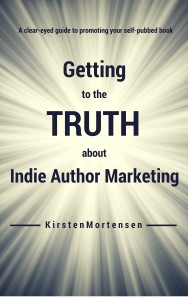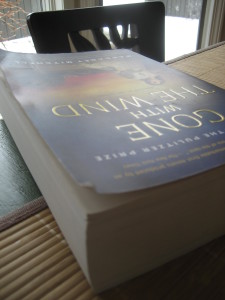
Getting to the Truth About Indie Author Marketing: A clear-eyed guide to promoting your self-pubbed book
As a fellow writer, I’m sure you share my fascination with the trickiness of the human mind.
It is, after all, one of the primary sources for conflict in fiction. Pick up any decent book or article on the craft of fiction, and you’ll soon find yourself reading about character motivation: what your characters want or desire.
“Desire drives the action,” notes novelist Carol Edgarian. “It is what makes characters real.”
But characters’ desire is only half the equation. Their desires must also be thwarted.
And very often, the thwarting comes not from external factors but from internal ones. Characters’ desires are thwarted because of their internal flaws and mistakes. Characters become their own worst enemies.
We writers are also, often, our own worst enemies
One of the most fascinating internal character flaws, in my opinion, is what author mentor K.M. Weiland calls “The Lie Your Character Believes.”
A character realizes he has a problem in his life. What he doesn’t realize, subconsciously or otherwise, is the true solution to his problem.
He thinks that if he can just have what he wants, all will be well.
In the the great English novel Middlemarch George Eliot follows a number of characters who are their own worst enemies, because they’re unable to see past the fantasies they’ve erected in their thinking. Their fantasies obscure reality.
Dorothea, for example, believes that marrying Edward Casaubon will fulfill her deepest desire. It will allow her to align herself with a cause that is larger than herself, that will make a mark on the world. Throughout the courtship period of the relationship, she builds a fantasy in which Casaubon is a man of extraordinary gifts, destined to publish a great scholarly work, The Key to All Mythologies.
Marrying Casaubon is what Dorothea thinks she wants.
But within a few weeks of being married to the man, she begins to realize she’s completely mistaken about her husband’s greatness and destiny. Much of the novel explores the sorrowful consequences of that mistake.
There are a zillion other examples in both literary and genre fiction. Think Scarlett O’Hara’s fantasy about Ashley Wilkes in Gone with the Wind, for example. She’s so committed to that fantasy that she fails to understand her true love is right there under her nose. A tragedy for the ages!
But here’s the thing: it’s not just our characters who struggle with this.
All humans do.
Including writers.
We think we know what is “real,” but we don’t.
In Getting to the Truth About Indie Author Marketing, one of the topics I explore is how difficult it is for we writers to really know what author marketing tactics work.
This is hugely important, because if you don’t really know what works, and what doesn’t work, you’re guessing.
You’re gambling.
And if you’re gambling with your money, chances are you’re going to get burned.
One problem is lack of data.
Professional marketers don’t make uninformed bets.
They make bets that are based on years’ of experience — and on DATA.
We indie authors don’t have data.
But we fool ourselves into thinking we do.
We think that by reading what other authors have done, we’re getting a true picture of how to market our titles.
Okay.
I’m going to be completely blunt here.
That’s a fantasy.
No matter how much time you — as an individual — invest in gathering information about how to market your indie book, you can’t begin to grasp the entire industry. You can’t begin to see the “big picture” information about what authors are doing that works, and what authors are doing that doesn’t work.
Think about it. There are some 300,000 indie titles published every year. In some cases, authors are publishing multiple titles, but even if we account for that, there are hundreds of thousands of indie authors out there.
You could read ten or 20 or 50 or 100 case studies about those authors, and what they’ve done to market their books.
You still wouldn’t have a representative sample of the industry from which you could draw any meaningful conclusions.
There’s a second factor as well: the information you do gather is almost certainly dated.
This industry moves at lightning speed. Factors that influence the effectiveness of specific marketing tactics change overnight. (Just look at the way Amazon’s introduction of Kindle Unlimited roiled the status quo for many authors.)
Third factor: there are so many indie authors out there trying to market their books, that if anyone gets a clever new idea that proves successful, within a matter of weeks thousands of other authors are doing the exact same thing. By the time you tumble to the idea, the novelty has worn off. Readers have tuned it out.
(Blog tours probably fall into this category; I’ll be including a chapter on blog tours in my book, and will write more about my research on blog tours in a future post.)
Last but not least, there’s the issue of cognitive bias. I’ll be exploring that in more depth in a future post, so be sure to come back, but in a nutshell: the human mind is wired in a way that makes it hard to make sense of data, even when we do have access to it.
So Is There Any Hope?
Actually, yes, there is.
However, making money at indie publishing is FAR from “a sure thing,” and if you think it is, odds are you’re going to be disappointed.
What we writers need to do is to approach marketing our books the way experienced, professional marketers approach their consumer products challenges.
We need to use data. We need to cultivate expertise in the principles of marketing so that we don’t so easily jump to erroneous conclusions. And we need to be honest with ourselves.
We need to be clear-eyed about what bets make sense, and what bets are just a waste of money.
More Coming!
Interested in staying in touch with what I post here? Want to know when Getting to the Truth About Indie Author Marketing will be available for sale? Please subscribe to my newsletter:
Have You Had an Experience with Author Marketing That You’d Like to Share?
I’d love to hear from you! Feel free to either leave a comment or click here to contact me using the form on my About page. Anyone who’s contribution is used in the book will receive a free e-copy on publication. (And yes, you can remain anonymous if you like.)

